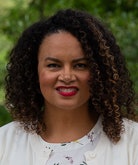Before she earned a masters and a Ph.D., before she became a full professor and a dean, before she published the book that sums up her life's work and her life experience, Terah Venzant Chambers was shaking in a pew. It was Convocation Day at Carleton College in Minnesota, and Chambers, then a freshman, gazed around Skinner Memorial Chapel, with its high stone walls and stained-glass windows.
“It was like a sea of whiteness. There were so few Black students,” said Chambers. “And I just felt like there was a spotlight on me saying, ‘She’s not supposed to be here. She’s an imposter. Who let her in this space?’”
It was a feeling that had roots reaching back to grade school.  Dr. Terah Venzant Chambers
Dr. Terah Venzant Chambers
“[Being a] smart Black girl made me weird,” she said. “There weren’t any other students like me in my classes and we didn’t have teachers who looked like us.”
When Chambers got into Carleton, a classmate told her that it was probably because of affirmative action.
“And I remember thinking like, probably, yeah,” she said.
Imposter syndrome plagued Chambers throughout her freshman year.




















